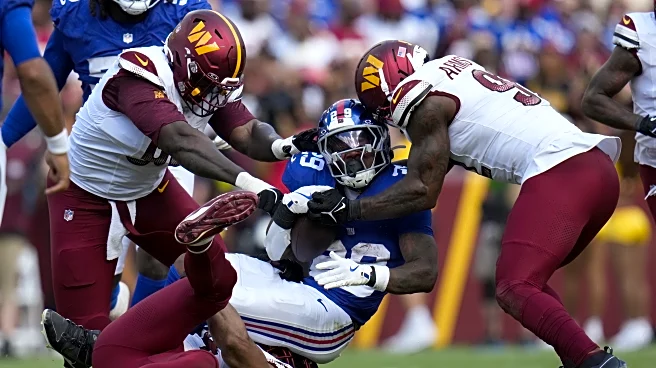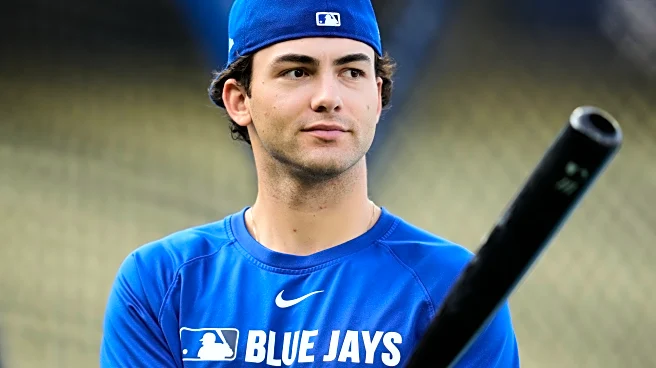“We have to get our stuff right.”
That was offensive coordinator Mike Kafka talking this week about what the New York Giants need to do this week to have a better performance against the Dallas Cowboys
than they did Week 1 in a touchdown-less 21-6 loss to the Washington Commanders.
How, though, can the Giants get that “stuff” right?
They scored just two field goals against Washington, one of those a 55-yarder by Graham Gano. They failed to get a touchdown with seven tries from the 10-yard line, including a first-and-goal at the 1-yard line. They were 0 for 2 in the red zone. They were just 4 of 16 (25%) on third-down conversions. Their running backs gained just 30 yards on 15 carries. Russell Wilson was just 17 of 37 (45.9%) passing, and was often uncomfortable in the pocket.
Kafka referred to the performance as “choppy.”
“I think we will continue to grow and get better with it as we work as a unit,” he said. “Up until that last drive really, it’s an eight-point game. So, we were just really right there, just couldn’t get enough going early. But I think we’ll change that. We’ll change the tides.”
Getting their stuff right starts with the run game.
“We have to establish the run first. I feel like, in any good offense you have to have a well-established run,” said running back Tyrone Tracy, who led the Giants with just 24 yards rushing on 10 carries vs. the Commanders. “Because if you don’t, it’s going to be really hard to do anything else.
“Whether it’s play action or even just a drop back pass. It’s really easy to do a lot of good stuff when you, obviously, are running the ball. it puts everybody at ease when you’re able to run the ball.”
Why weren’t the Giants able to establish the run against Washington, a team that was 28th in the NFL in yards allowed per rushing attempt in 2024?
“We just missed,” Kafka said. “We missed on a few things, whether it was a block here or a read key here.”
Both Tracy and left guard Jon Runyan Jr. referred to movement by the Commanders’ defensive line that caused issues for the Giants’ blocking schemes.
“Week two, week three, we played them last year, we ran all over them,” Runyan said. “They were one of the worst teams in the NFL, stopping the run the previous year, and that was a point of emphasis for them this year, stopping the run, and they did a good job.
“They had a good game plan for us, and we definitely need to execute better. And they moved a lot, they had a good game plan in the run and pass, and well-executed, that’s for sure.”
The Giants ran for 129 yards on 22 carries (5.9 yards per carry) in Week 2 last season, then 164 yards on 31 carries (5.3 yards per carry) in their second meeting.
“I would say the movement got us up front,” Tracy said. “But for the most part, it was more on us. We got to handle our stuff better.Whether it’s just being prepared for the things that’s going to happen within the game. And then just executing. Without the run game, it’s really hard to have an efficient offense.”
Runyan said “I believe we have the tools to be successful,” but added that a single missed assignment can wreck a play even if everyone else does things correctly.
“I feel like if it wasn’t me, if it wasn’t the center, if it was somebody else, if it was a tackle, it was a tight end, everybody is all tied together,” Everybody has to do their job, and that one person, everybody can have the best block of the game, and that one person takes too short of a step, and the play gets blown up, and that’s how it is.“
The Giants ran 13 plays in the red zone, and 12 of those were passes. Tracy clearly wasn’t thrilled about that.
“I’m not ain’t the play caller, I got to do what’s called,” Tracy said. “But I definitely said we needed to run the ball on the one-yard line.
“I feel like everyone felt the same. Whether it’s off the line, quarterback, running back, whatever. And I think that to do the play action pass off the line, you have to run the ball first.That’s how I feel. But whatever the play is called, we got to go out there and execute it at a high level.”
Runyan suggested spreading the field more rather than running the high number of heavy, tight formations the Giants used vs. Washington.
“I felt like we were running a lot of base, two tight end runs, and that kind of adds a lot of people into the box, and the more people that get out of the box, the probability of somebody getting beat goes up,” Runyan said. “That’s how the game was being called, and as players, we don’t have control over that. We’re going out there to execute the play call.”










